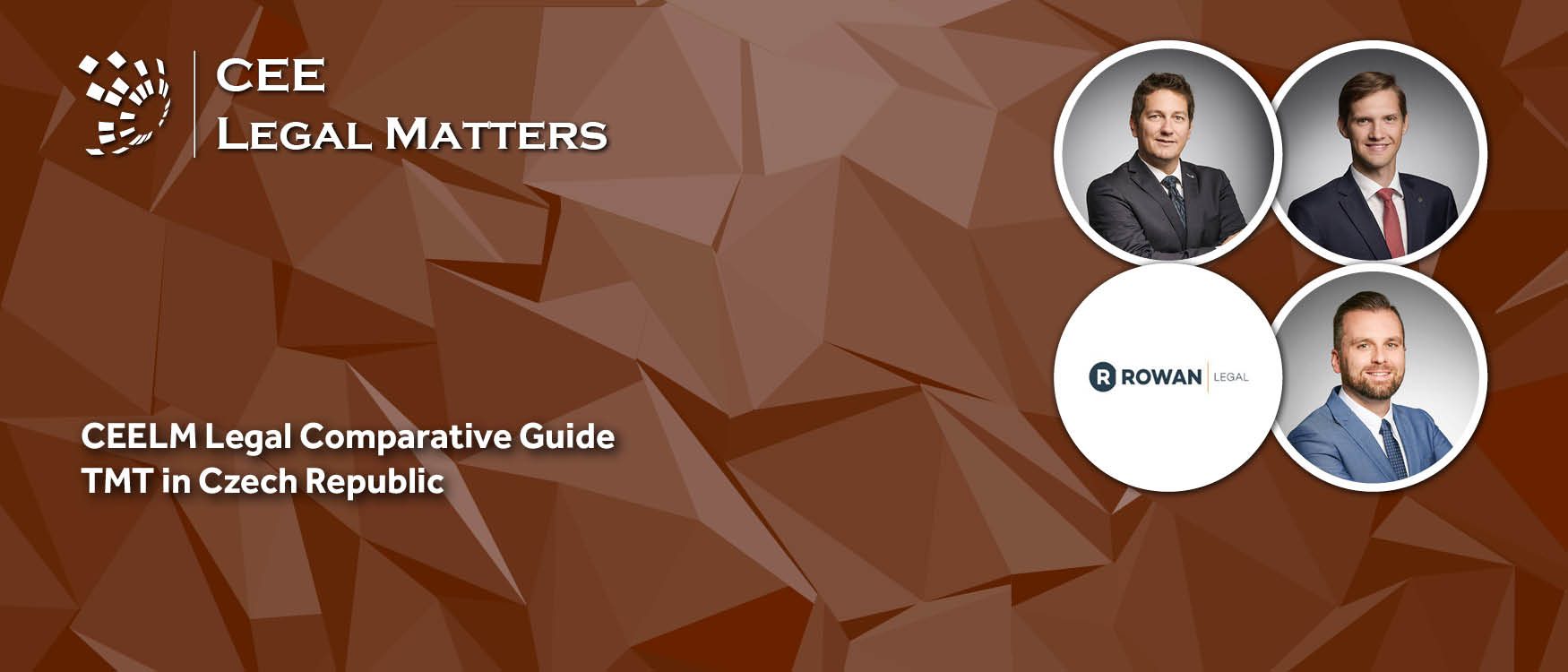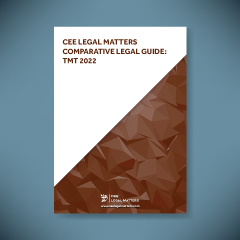Contributed by Rowan Legal.
1. Legal framework for writing and electronic contracts
a. What are the requirements in your jurisdiction to consider a document to be in writing? Are there any formal/technical requirements?
According to Article 562(1) of Act no. 89/2012 Coll., the Civil Code, as amended, the written form of a legal act is preserved when the legal act is made by electronic or other technical means that enable the recording of its content and the identification of the person acting. Therefore, a document is in writing if its content is recorded, either physically, or electronically.
Should an electronic document present a legal act, it must also be properly signed by the person acting, using a digital signature (see Article 2a).
In some cases, the law may require a paper form of a document, which means a physical form only. In these cases (e.g., a contract that transfers the ownership of real estate) such legal acts cannot be made electronically.
b. Are electronic documents [e.g., an email] per se considered to be in writing under your law?
Yes, as an email fulfills the requirement of its content being recorded pursuant to Article 562(1) of the Civil Code (see Section 1.a.).
c. What probative power paper and/or electronic documents have that are to be considered in writing?
In theory, the probative power of paper and electronic documents is equal. E.g., pursuant to Article 79(2) of Act No. 99/1963 Coll., the Code of Civil Procedure, as amended, the applicant in civil proceedings may attach evidence to an application in either paper or electronic form. In practice, the probative power of documents relies on the individual nature of the document and its signature, as in particular cases it may be easier or more difficult to challenge the validity of the document.
d. What are the general rules and requirements to conclude a contract electronically?
Czech law allows contracts to be concluded in various forms, namely in writing, orally, or implicitly. In some cases, contracts must be made in writing, but that does not exclude electronic documents (see Section 1.a.). A contract is concluded when its parties agree on its content (Article 1725 of the Civil Code). Since concluding a contract is a legal act, the signatures of the parties are required (Article 561(1) of the Civil Code).
Rarely, the law may require a legal act (i) to be made in the form of a public deed (pursuant to Article 3026(2) of the Civil Code this is usually a notarial record) or (ii) to have the signatures of all the parties on the same page of paper (e.g., contracts that transfer the ownership of real estate) – in which case such legal acts cannot be made electronically.
e. Are there any sector-specific rules that define further requirements to conclude contracts electronically [e.g., contracting via an authenticated electronic channel, contracting via video chat, etc.]?
There are some relevant sector-specific rules relating to anti-money laundering regulations. If identification of a party is required in the process of concluding a contract, such identification must be done physically, not online, which may limit the options for the electronic conclusion of a contract.
2. Digital signatures
a. Are there any laws regulating the use of digital signatures in your jurisdiction?
The main regulation applicable in the Czech Republic is Regulation (EU) No 910/2014 of the European Parliament and of the Council of 23 July 2014 on electronic identification and trust services for electronic transactions in the internal market and repealing Directive 1999/93/EC (eIDAS Regulation). In terms of national law, the relevant act is Act No. 297/2016 Coll., on trust services for electronic transactions, as amended (Act on Services).
b. Is there any difference between the different types of digital signatures in your jurisdiction?
Yes, the difference between the different types of digital signatures depends on their use, as for certain purposes, only certain types may be used. The Act on Services also establishes a specific local type of digital signature called a recognized electronic signature, which is an advanced electronic signature based on a qualified certificate for electronic signatures or a qualified electronic signature (Article 6(2) of the Act on Services).
c. What probative power each type of digital signature has in your country?
Contrary to the eIDAS Regulation and pursuant to the Act on Services, any type of digital signature is considered to be a handwritten signature, so any type of digital signature may be used freely unless stipulated otherwise by law (Article 7 of the Act on Services). Please note, however, that the aforementioned interpretation has been subject to some degree of professional debate, despite the fact that it was clearly the lawgiver’s intent to create a different regulation from the eIDAS Regulation. Therefore, in theory, the probative power of various types of digital signatures is the same. In practice, however, the probative power of digital signatures differs, as in particular cases it may be easier or more difficult to challenge the validity of the signature.
d. Are there any specific groups of people that are required to have digital signatures [e.g., attorneys, notaries, government officials, etc.]?
According to the law, when exercising their powers public authorities and persons are obliged to use a qualified electronic signature to sign electronic documents (Article 5 of the Act on Services). When signing an electronic document by which an act is performed in relation to a public signatory or another person in connection with the exercise of their powers, only a recognized electronic signature may be used for signing with an electronic signature (Article 6(1) of the Act on Services).
e. Are non-personalized digital stamps recognized in your country with probative power [e.g., digital stamps used by companies, government, or administrative bodies]?
In the Czech Republic, electronic seals pursuant to Section 5 of the eIDAS Regulation and Articles 8–10 of the Act on Services are recognized.
3. Digital archiving
a. Are there any laws regulating digital archives and digital archiving in your jurisdiction?
Yes, Act No. 499/2004 Coll., on archives and record management and on amendments to certain acts, as amended (Act on Archives), mostly in its Title II, where the performance of filing services is covered. The performance of filing services means ensuring the professional management of documents arising from the activities of the originator, or from the activities of its legal predecessors, including their proper receipt, registration, distribution, circulation, handling, execution, signing, dispatch, storage, and disposal by shredding, including the checking of these activities (Article 2(l) of the Act on Archives).
b. What are the main legal and technical requirements to digitally archive documents?
Public originators carry out, by default, filing services in electronic form in electronic filing systems. Where public originators perform filing services in an electronic filing system that is part of an information system for the handling of classified information, such a system must meet the requirements set out in the national standards. Originators maintain a register of names for the automatic processing of data on the senders and addressees of registered documents. When documents are processed, all documents relating to the same matter are combined in a file. Documents in digital form are linked to each other by means of metadata. Public originators may use special technological means which may substitute an electronic signature, electronic seal, electronic time stamp, or other electronic means for a similar purpose, exclusively for the needs of the originator concerned; these special technological means must make it possible to detect any subsequent modification of the data in the document and to unambiguously verify the identity of the person who attached it. (Article 63–65 of the Act on Archives)
c. Is there any difference in your country’s regulations between the digital archiving of paper and electronic documents?
No, aside from the differences originating from the form of the document. E.g., paper documents relating to the same matter are combined in a file physically, whereas digital documents are combined by metadata.
d. Is any third party required to participate in the process of digital archiving in your country [e.g., a trusted service provider, government / administrative bodies, etc.]?
All electronic filing systems used for archiving must meet the requirements of the Act on Archives, Decree No. 259/2012 Coll., on the details of the filing service, and the national standards. Compliance with these requirements must be confirmed by an attestation (Article 69e of the Act on Archives). Attestation is performed by attestation centers – various subjects pursuant to Article 69b of the Act on Archives.
e. Are there any sector-specific requirements and rules for digital archiving [e.g., archiving both the software and the related data to retrieve information in the financial sector]?
No. The requirements for archiving generally do not distinguish between physical and digital documents. Some related issues concern the validity of electronic signatures on digital documents, for which reason electronic time stamps are usually employed. On the other hand, where electronic legal transactions are carried out and stored in an electronic system in a systematic and sequential manner and are protected against alteration, such records are by law presumed to be reliable (Article 562(2) of the Civil Code), thus repeated application of electronic time stamps may be unnecessary in such cases.






